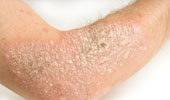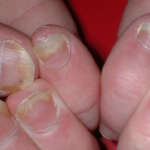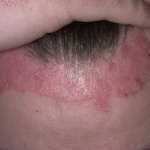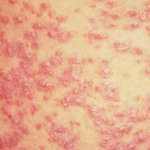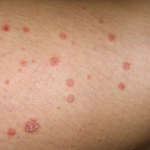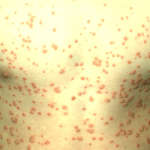Psoriasis
Psoriasis is a condition that causes the body to make new skin cells in days rather than weeks. As these cells pile up on the surface of the skin, you may see thick, scaly patches.
Plaque psoriasis is the most common type of psoriasis
Those thick, scaly patches that develop on the skin are called plaques (placks). About 80% to 90% of people living with psoriasis get plaques, so they have plaque (plack) psoriasis.
Plaques can appear anywhere on the skin, but you’re most likely to find them on the:
- Knees
- Elbows
- Lower back
- Scalp
Plaques tend to vary in size. They may appear on the skin as a single patch or join together to cover a large area of skin.
No matter the size, plaques tend to be itchy. Without treatment, the itch can become intense. Some people notice that their skin stings, burns, or feels painful and tight.
Because psoriasis tends to be a life-long disease, it helps to learn about it and see a board-certified dermatologist at our McLean and Woodbridge offices. A bit of knowledge and help from a board-certified dermatologist can give you some control over the psoriasis. By gaining control, you can see clearer (or clear) skin. Gaining control can also help you to feel better, improve your overall health, and prevent the psoriasis from worsening.
Gaining control often involves:
- Learning (and avoiding) what triggers your psoriasis
- Sticking to a good psoriasis skin care routine
- Living a healthy lifestyle
- Using medication when necessary
Photo Gallery
Frequently Asked Questions
The affected skin will appear elevated, plaque-like with thick silvery-white scales. It may or may not itch. Although it can appear anywhere on the body, psoriasis is most commonly detected on the elbows, knees and scalp. Some sufferers have even had cases on the genitals and nails. In most instances, the problem is focused on one spot of the body. However, it can also be seen throughout the body.
Psoriasis is a heredity disease. However, it can also be triggered by certain medications. Smoking and alcohol can further aggravate the condition making it difficult to treat.
Psoriasis is not contagious. Contrary to popular belief, it is not an infection and cannot be transmitted through contact. You do not need to worry about spreading psoriasis to other people through contact or indirect contact such as clothing.
At this time, there is no cure for psoriasis. However, there are a number of different ways to control and manage this skin disease. In fact, there are several ways to treat psoriasis so that the skin does not undergo an inflammatory reaction and the psoriasis is well managed.
When you work with our dermatologists, you can explore various effective treatment options. An examination will help determine which options may be best for you based on several factors. Much of this has to do with the location of your outbreaks and the severity. Your age, medical history and reactions or allergies to certain medications or topical solutions will also play a role in deciding what you should use for treatment.
Treatment options include phototherapy, topical solutions, orally administered medications, self-administered injections or a combination of treatments.
Most patients who seek treatment for psoriasis do feel better about their physical appearance. Although there is no cure for this skin disease, some treatments can help reduce inflammation or cause a long period of remission for psoriasis spells. Being able to go through your daily routine without being self-conscious about your skin can have a huge impact on how you look and feel.
It can be embarrassing and unpleasant to deal with psoriasis. However, you have options. Contact our dermatologists to get treatment today.

